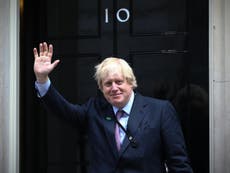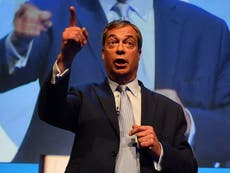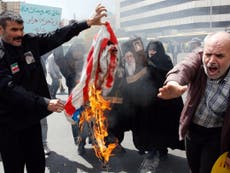No, Madonna, your Eurovision performance will do nothing to heal the wounds wrought by Israeli apartheid
No on stage message of ‘dialogue’ or ‘inclusivity’ will bring the required structural change for Palestinians and Israelis to live in equality
In the last few years of his life my father suffered from dementia. It was hard to talk to him about his likes and dislikes because he didn’t always remember what they were. Along with his deteriorating health he gradually began to lose interest in almost everything, but his love of music persisted. He was a dedicated audiophile who spent years building a special listening room. We spent hours there listening to Bruckner, Fayruz, Bowie, Mahler, Gregorian Chants, and Madonna. Lots and lots of Madonna. First on records, then on CDs, and then on laserdiscs.
My father was almost 90 when he passed away. His life was really good and full of love – it was as fair a deal as humans get. Born in the mid 1920s in British occupied Palestine, he fought against the British Mandate in the Jewish Irgun (we still have a gun that he stole from a British soldier when he was 14), forged passports in Italy, lost an eye from a grenade blast and was still an extraordinary painter. When telling us stories about those times he always insisted that life just carried him places, that he did not choose the paths he took because there was no choice.
This was just the way things happened in this part of the world during that time, necessity sent you places and carved the way for you: his mother’s cousin, a member of NILI (the Jewish espionage network that fought the Ottomans to bring the British to Palestine) was hung in Syria, and his great grandmother an orphan from Tunisia was sent to Palestine by herself on a boat in the 19th century.
The passage of time lends a great birds-eye view to the ironies of life. One generation is sent to Palestine from Tunisia, another fights the Ottomans to bring the British to the region, another fights the British to drive them away from Palestine. Since my father’s life spun many decades he had the chance to not only reflect on these ideological collisions but to also act on them and attempt to fix the political reality he helped create.
By 2014, when Madonna compassionately tweeted about the children of Gaza as they were being slaughtered by Israel, my father had already been marching with Palestinian flags in Tel-Aviv calling to end the siege on Gaza and occupation of the West Bank. An avid and active defender of human rights he understood what all justice seekers understand: that the old saying “none of us are free until we are all free” is a matter of life and death for the oppressed.
He understood that one can not champion workers’ rights without seeking justice for all workers, Palestinian workers included, and that one cannot position oneself as a promoter of women’s rights without promoting the rights of all women, Palestinian women included.
Israel’s systematic mistreatment of Palestinian women affects them harshly in almost every sphere. When Palestinian women give birth they are regarded as a “demographic threat”. Palestinian women are deprived of their right to family reunification, and are constantly subjected to humiliation and harassment at military checkpoints, where some have been forced to give birth without any medical attention. The Israeli government imprisons Palestinian cultural workers, prevents Palestinian artists from travelling abroad and shuts down Palestinian theatre and literary festivals.
One cannot promote women’s rights on one side of the world and at the same time ignore the plea of Palestinian women to boycott Israel until it grants them internationally-recognised civil and political rights. When Madonna performs tonight in Israel and ignores the Palestinian call for solidarity, she will be ignoring the plea of Palestinian women to stand with them, or at least not interrupt them, as they construct avenues to defend and claim their rights.
International artists wrongly believe that with the right on-stage message their performance will contribute to a regional peacemaking effort. But the problem Palestinians are facing is not that Israelis aren’t inspired enough – it’s that an Israeli regime has been systematically oppressing Palestinians for decades. What is needed is a structural change wherein Israel will abide by international law, and end its occupation and apartheid policies.
In apartheid South Africa, whites who believed apartheid was bad were not offended by the decision of artists to heed the call for boycott and not perform in Sun City. They understood that calling for boycott, divestment, and sanctions against South Africa was a peaceful strategy for forcing the hands of the government via international pressure to give up its oppressive policies.
My father also understood this. His common sense told him that since the Jewish state he fought for is de facto an apartheid state, ethical principles demand that any non-violent means must be used to end its international law violations, the siege, the occupation, the dozens of racist laws and criminal policies which deny millions of Palestinian refugees their legal and UN-stipulated right of return. And though he loved music more than almost anything, he supported Boycott, Divestment and Sanctions (BDS) because he understood that music does not transcend all, that a show does not take place in a vacuum.
In Israel where decades-long military occupation and apartheid policies are the status quo, no on-stage message of “dialogue” or “inclusivity” will bring the required structural change for Palestinians and Israelis to live in equality. The ultimate goal of a grassroots movement like BDS is to create an equal world wherein it’s possible for music to truly bring people together. In the meantime, artists who believe that all people deserve equal rights should refrain from playing in Israel.
Music fans in the UK who want to celebrate the joys of music without crossing a picket line can tune in to broadcasts like Globalvision – an alternative Eurovision put on by Palestinian and international Eurovision fans – which offer a true celebration of cultural exchange and an uplifting vision of what solidarity through art and music looks like.
Ohal Grietzer is an Israeli composer and mixed-media performer





Join our commenting forum
Join thought-provoking conversations, follow other Independent readers and see their replies